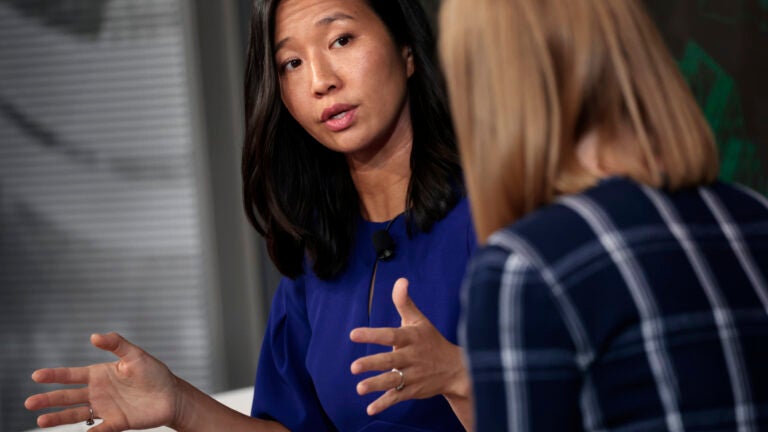Local News
Boston Mayor Michelle Wu, speaking at the annual Boston Globe Summit, said that leaders at all levels of government need to accelerate plans to fight climate change.

Boston Mayor Michelle Wu called on leaders at all levels of government Thursday to increase their sense of urgency when it comes to solving the problems posed by climate change.
Wu’s comments came during the third day of the annual Boston Globe Summit, when she sat down for a conversation with the Globe’s Washington, D.C., Bureau Chief Jackie Kucinich. Asked if she felt that her sense of urgency is reflected at the national level, Wu bluntly replied “no,” to chuckles in the audience.
“I feel desperate and impatient every day seeing the headlines, thinking about the world my kids are going to grow up in, and then coming up against the reality of systems that take a long time to move,” Wu said. “It’s staggering when you think about how much we need to do and how little attention is actually focused on this.”
Wu clarified that this urgency isn’t even reflected in the policies of the city government. But complicating efforts to think about long-term sustainability is the fact that climate change is wreaking havoc on a nearly weekly basis. Emergency preparedness is essential, she said, as her administration balances keeping residents safe in the immediate future and in the decades to come.
The mayor, who campaigned on a platform of actively addressing climate change, said that she feels frustrated because much of what needs to be done is beyond the limits of Boston’s resources. Wu called for more collaboration with the state government, saying that about 50 percent of Boston’s coast is managed by the state.
About 30 percent of the city’s emissions come from transportation, while about 70 percent come from buildings, Wu said. Her administration is working to make sure building emissions are accurately reported and tracked so that they can be reduced.
That will be a decade-long process, Wu said, so city officials are taking steps like eliminating fossil fuels from publicly subsidized housing and launching a pilot program to retrofit smaller buildings. That pilot program, announced Thursday, will give owners selected through a lottery the resources to electrify and decarbonize their homes.
Committing to addressing climate change is doubly important because it offers new avenues for job growth, Wu said. She highlighted the city’s PowerCorpsBOS program, where young adults are paid to engage in green job training.
“The big picture is, we are aiming to be a fossil fuel-free city that includes everyone, and that’s going to take working as fast as we can but also ensuring that we’re putting equity in the center,” Wu said.
She touched on how transportation impacts climate change. This starts with the beleaguered MBTA, where safety concerns and reliability issues have caused commuters to lose faith in the transit system. Wu said she was excited by the recent addition of a city government seat on the T’s Board of Directors.
“We intend to use it very well,” she said.
The city has a unique ability to impact the T’s bus system. Although the vehicles are owned and operated by the transit agency, Wu’s administration controls how street space is allocated. Adding things like dedicated bus lanes and properly-timed signals are efforts that go a long way, she said.
Wu teased that the city is building a public dashboard that will combine various types of data to give a real-time look at Boston’s climate change response. This could include data such as MBTA ridership, the number of electric vehicle charging stations installed, and how many residents who are trained in green jobs.
To round out the conversation, Wu said she hopes her generation of leaders is taking climate change more seriously than their predecessors. This trend is likely to continue, she added, saying that the young people she interacts with are spurred to action even more.
“My generation, the millennials, were the first for whom it’s not essentially guaranteed that your life outcomes, your economic station in life will be better than your parents,” Wu said. “I think there’s a very strong realization from young people that our lives are on the line, our entire future rests in, collectively, our planet getting its act together in this next very short window.”
Newsletter Signup
Stay up to date on all the latest news from Boston.com